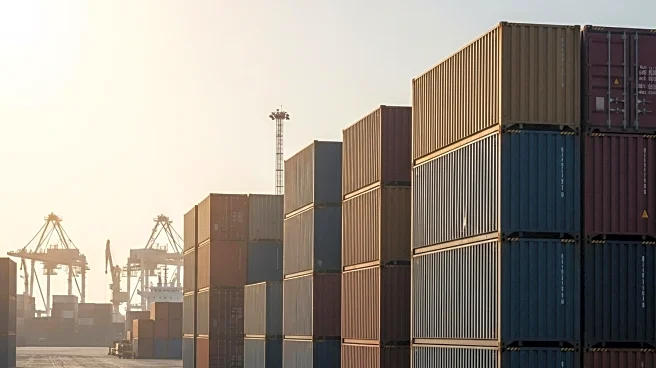What is the story about?
What's Happening?
China's global exports reached a six-month high in September, marking an 8.3% increase from the previous year, totaling $328.5 billion. Despite this growth, exports to the United States fell by 27% compared to the previous year, continuing a six-month decline. The renewed trade tensions between China and the US have escalated, with President Trump threatening a 100% tariff on Chinese goods and imposing export controls on critical software. In retaliation, China announced new port fees for American ships and extended export controls on lithium-ion batteries and rare earths. These developments have cast doubt on the potential meeting between President Trump and Chinese President Xi Jinping, as both nations struggle to reach a comprehensive trade agreement.
Why It's Important?
The ongoing trade tensions between China and the United States have significant implications for global trade dynamics and economic stability. The imposition of tariffs and export controls could disrupt supply chains, affecting industries reliant on Chinese imports, such as technology and manufacturing. The decline in exports to the US may push China to seek alternative markets, potentially reshaping global trade patterns. The situation also highlights the fragility of international trade agreements and the impact of geopolitical conflicts on economic relations. Stakeholders in both countries, including businesses and policymakers, face uncertainty as they navigate these challenges.
What's Next?
The future of US-China trade relations remains uncertain, with potential consequences for global economic stability. If the tariff threats and export controls escalate, industries dependent on Chinese imports may face increased costs and supply chain disruptions. The upcoming meeting between President Trump and President Xi Jinping could be pivotal in determining the direction of trade negotiations. Both countries may need to engage in diplomatic efforts to resolve differences and avoid further economic fallout. The international community will be closely monitoring these developments, as they could influence global trade policies and economic strategies.
Beyond the Headlines
The trade tensions between China and the US could have long-term implications for international relations and economic policies. The situation underscores the importance of diplomatic engagement and negotiation in resolving trade disputes. It also highlights the interconnectedness of global economies and the potential ripple effects of bilateral conflicts. As China seeks to diversify its export markets, other regions may experience increased trade opportunities, potentially altering global economic dynamics. The situation may also prompt discussions on the need for more resilient and adaptable supply chains in the face of geopolitical uncertainties.

















